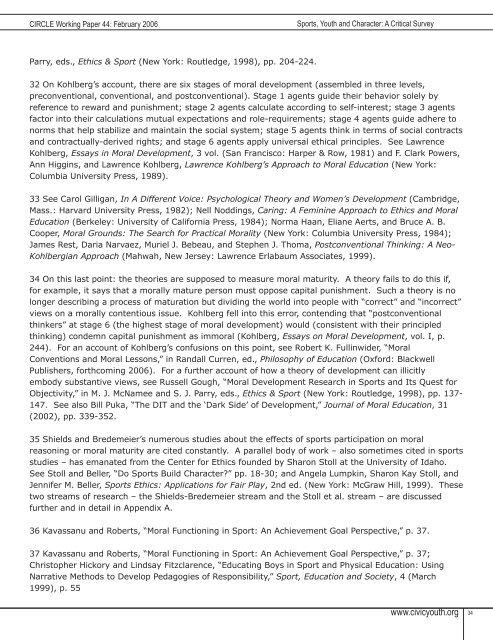The All-Sports Ministry of PA NJ & DE - Executive Summary Start-Up Budget & Prospectus
The All-Sports Ministry of PA NJ & DE - Executive Summary Start-Up Budget & Prospectus
The All-Sports Ministry of PA NJ & DE - Executive Summary Start-Up Budget & Prospectus
Create successful ePaper yourself
Turn your PDF publications into a flip-book with our unique Google optimized e-Paper software.
CIRCLE Working Paper 44: February 2006<br />
<strong>Sports</strong>, Youth and Character: A Critical Survey<br />
Parry, eds., Ethics & Sport (New York: Routledge, 1998), pp. 204-224.<br />
32 On Kohlberg’s account, there are six stages <strong>of</strong> moral development (assembled in three levels,<br />
preconventional, conventional, and postconventional). Stage 1 agents guide their behavior solely by<br />
reference to reward and punishment; stage 2 agents calculate according to self-interest; stage 3 agents<br />
factor into their calculations mutual expectations and role-requirements; stage 4 agents guide adhere to<br />
norms that help stabilize and maintain the social system; stage 5 agents think in terms <strong>of</strong> social contracts<br />
and contractually-derived rights; and stage 6 agents apply universal ethical principles. See Lawrence<br />
Kohlberg, Essays in Moral Development, 3 vol. (San Francisco: Harper & Row, 1981) and F. Clark Powers,<br />
Ann Higgins, and Lawrence Kohlberg, Lawrence Kohlberg’s Approach to Moral Education (New York:<br />
Columbia University Press, 1989).<br />
33 See Carol Gilligan, In A Different Voice: Psychological <strong>The</strong>ory and Women’s Development (Cambridge,<br />
Mass.: Harvard University Press, 1982); Nell Noddings, Caring: A Feminine Approach to Ethics and Moral<br />
Education (Berkeley: University <strong>of</strong> California Press, 1984); Norma Haan, Eliane Aerts, and Bruce A. B.<br />
Cooper, Moral Grounds: <strong>The</strong> Search for Practical Morality (New York: Columbia University Press, 1984);<br />
James Rest, Daria Narvaez, Muriel J. Bebeau, and Stephen J. Thoma, Postconventional Thinking: A Neo-<br />
Kohlbergian Approach (Mahwah, New Jersey: Lawrence Erlabaum Associates, 1999).<br />
34 On this last point: the theories are supposed to measure moral maturity. A theory fails to do this if,<br />
for example, it says that a morally mature person must oppose capital punishment. Such a theory is no<br />
longer describing a process <strong>of</strong> maturation but dividing the world into people with “correct” and “incorrect”<br />
views on a morally contentious issue. Kohlberg fell into this error, contending that “postconventional<br />
thinkers” at stage 6 (the highest stage <strong>of</strong> moral development) would (consistent with their principled<br />
thinking) condemn capital punishment as immoral (Kohlberg, Essays on Moral Development, vol. I, p.<br />
244). For an account <strong>of</strong> Kohlberg’s confusions on this point, see Robert K. Fullinwider, “Moral<br />
Conventions and Moral Lessons,” in Randall Curren, ed., Philosophy <strong>of</strong> Education (Oxford: Blackwell<br />
Publishers, forthcoming 2006). For a further account <strong>of</strong> how a theory <strong>of</strong> development can illicitly<br />
embody substantive views, see Russell Gough, “Moral Development Research in <strong>Sports</strong> and Its Quest for<br />
Objectivity,” in M. J. McNamee and S. J. Parry, eds., Ethics & Sport (New York: Routledge, 1998), pp. 137-<br />
147. See also Bill Puka, “<strong>The</strong> DIT and the ‘Dark Side’ <strong>of</strong> Development,” Journal <strong>of</strong> Moral Education, 31<br />
(2002), pp. 339-352.<br />
35 Shields and Bredemeier’s numerous studies about the effects <strong>of</strong> sports participation on moral<br />
reasoning or moral maturity are cited constantly. A parallel body <strong>of</strong> work – also sometimes cited in sports<br />
studies – has emanated from the Center for Ethics founded by Sharon Stoll at the University <strong>of</strong> Idaho.<br />
See Stoll and Beller, “Do <strong>Sports</strong> Build Character?” pp. 18-30; and Angela Lumpkin, Sharon Kay Stoll, and<br />
Jennifer M. Beller, <strong>Sports</strong> Ethics: Applications for Fair Play, 2nd ed. (New York: McGraw Hill, 1999). <strong>The</strong>se<br />
two streams <strong>of</strong> research – the Shields-Bredemeier stream and the Stoll et al. stream – are discussed<br />
further and in detail in Appendix A.<br />
36 Kavassanu and Roberts, “Moral Functioning in Sport: An Achievement Goal Perspective,” p. 37.<br />
37 Kavassanu and Roberts, “Moral Functioning in Sport: An Achievement Goal Perspective,” p. 37;<br />
Christopher Hickory and Lindsay Fitzclarence, “Educating Boys in Sport and Physical Education: Using<br />
Narrative Methods to Develop Pedagogies <strong>of</strong> Responsibility,” Sport, Education and Society, 4 (March<br />
1999), p. 55<br />
www.civicyouth.org 34

















